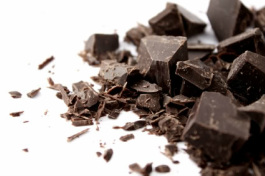 Perhaps. At least it is for mice as of a 2011 study. (1) It is not a perfect connection to make to humans but the conclusions from this particular study are not farfetched either. To this day, it remains a favorite study of mine because the implications of it involve one of my favorite things: Dark Chocolate. At this point, it is no secret that dark chocolate can provide a number of health benefits. Some of these include being an excellent source of antioxidants and several minerals like iron, magnesium and copper as well as being linked to lowering the risk of heart disease, improving HDL and LDL values, and improving blood flow. (2) Flavonoids (or flavonols), chemical compounds found in plants, the cocoa plant in this case, have been implicated in a number of studies as being critical to many aspects of human physiology including the aforementioned examples. A particular flavonol called (-)-epicatechin (known as 'minus' epicatechin), which is present in dark chocolate, has garnered attention over the last several years and was the target of interest in the 2011 study involving mice. Twenty-five mice were randomly split into four groups: 1) water only, 2) water and daily exercise, 3) (-)-epicatechin only, and 4) (-)-epicatechin and daily exercise. All of the mice performed a treadmill test on day 0, underwent their assigned intervention over the course of 15 days and were tested again on the treadmill. The group that received (-)-epicatechin and daily exercise showed significant improvements in all outcomes but boasted an almost 50% increase in distance compared to their initial treadmill test. In comparison, neither of the water groups showed improvements on the treadmill test and actually performed worse overall compared to their initial test. A surprising outcome was the group that received (-)-epicatechin only also performed extremely well. Their treadmill test was nearly as good as the group who exercised. Upon further examination of the two (-)-epicatechin groups, it was discovered that there was a significant increase in capillarity (blood vessels) in skeletal muscle as well as an increase in number and size of mitochondria (the energy factories of cells) in skeletal and cardiac muscle. As with the treadmill test, the group that received (-)-epicatechin and exercised showed the most change but again, even (-)-epicatechin only showed significant changes as well compared to the water groups. In short, this means the mice were able to deliver more blood (read: oxygen) to their muscles and produce more usable energy than their counterparts who only received water. It is no wonder then that they were able to run longer and farther, and fatigue at a slower rate.  So what conclusions can we draw from this? Considering the similarities of skeletal and cardiac muscle among mammals, it is entirely plausible that (-)-epicatechin found in dark chocolate could have the same effect on humans as it does on mice. Clearly the greatest benefit was coupled with exercise but even that wasn't necessary to gain results. Since both groups showed significant improvements, there doesn't appear to be a major advantage of timing your dark chocolate intake. As long as you eat it daily, you will have consistent levels of (-)-epicatechin in your system. It is important to note that all dark chocolate is not created equal. If you plan on adding this to your diet, dark chocolate with higher percentages of cocoa (cacao) will have more (-)-epicatechin so you may want to look for 70-75% or higher depending on your tastes. The only downside that I foresee is that this does not mean you can eat dark chocolate until your heart is content, which is a true shame. The levels administered to the mice would equate to rather small portions, on the order of a half to a full square per day for humans, in order to have the same desired effect. Unfortunately, more is not better in this case. This type of self control and will power may be difficult for some but the potential benefits could really prove to be performance enhancing. What is not known is whether these types of physiological changes plateau after a certain amount of time or if it would even have an effect on those who are already at a higher level of fitness. Either way I'll take my chances since dark chocolate is absolutely delicious to begin with and at the very least I can take advantage of the other health benefits it has to offer anyway. It sounds like a win-win to me. References: 1. L. Nogueira, I. Ramirez-Sanchez, G. A. Perkins, A. Murphy, P.R. Taub, G. Ceballos, F.J. Villarreal, M.C. Hogan, M.H. Malek. (-)-Epicatechin enhances fatigue resistance and oxidative capacity in mouse muscle. The Journal of Physiology. 589.18. 2011 pp 4615-4631. 2. Gunnars, Kris. "7 Proven Benefits of Dark Chocolate." Authority Nutrition. 13 June 2013. Web. 11 June 2014. Knowledge = Power; Share the Power:
0 Comments
Leave a Reply. |
Dr. Greg Cecere
Your personal physical therapist, movement educator and knowledge dispenser. Newsletter Sign Up
Enter your name and email to get Momentum PT's Movement Manual delivered straight to your inbox! It's your free monthly newsletter and guide to moving better, feeling better and living better! Archives
April 2017
Categories
All
Disclaimer:
The contents of this blog is meant for educational purposes only. Momentum Physical Therapy of New Paltz and Dr. Greg Cecere are not responsible for any harm or injury that may occur due to any information on this blog as it is by no means a substitute for a thorough evaluation by a medical professional. |
|
Momentum Physical Therapy of New Paltz, PLLC. Copyright © 2013-2024. All Rights Reserved.
Disclaimer: The contents of this site is meant for educational purposes only and utilization of any of the material is a personal choice. Momentum Physical Therapy of New Paltz and Dr. Greg Cecere are not responsible for any harm or injury that may occur due to those choices. This site is by no means a substitute for a thorough evaluation and guidance by a licensed medical professional.
|
 RSS Feed
RSS Feed
